A coaching leader is highly recommended for a start-up unicorn for several reasons:
Scaling Leadership
As a start-up grows into a unicorn, the leadership requirements change. A coaching leader helps the founder/CEO to scale their leadership, developing the skills needed to manage a larger, more complex organization.
Talent Development
Unicorns need to attract and retain top talent to maintain their competitive edge. A coaching leader focuses on developing the skills and abilities of their team members, ensuring they have the expertise needed to drive the business forward.

Innovation and Adaptability
Start-ups need to innovate continuously to stay ahead. A coaching leader encourages experimentation, learning from failures, and adaptability, fostering a culture of innovation within the organization.
Strategic Decision-Making
As a unicorn, strategic decisions have a significant impact on the business. A coaching leader helps the leadership team develop their strategic thinking, ensuring they make informed, data-driven decisions.
Cultural Alignment
A coaching leader ensures that the company culture aligns with its mission, vision, and values. This helps maintain a positive, productive work environment, even as the organization grows and evolves.

Accountability and Feedback
Coaching leaders promote a culture of accountability and feedback, helping team members understand their strengths, weaknesses, and areas for improvement. This leads to better performance, increased job satisfaction, and reduced turnover.
Networking and Partnerships
A coaching leader can facilitate connections with other entrepreneurs, investors, and industry experts, helping the unicorn build strategic partnerships and access new markets.
Emotional Intelligence and Well-being
The pressures of leading a unicorn can be intense. A coaching leader prioritizes emotional intelligence, well-being, and self-care, helping the leadership team manage stress and maintain their physical and mental health.

Governance and Compliance
As a unicorn, there are increased regulatory and compliance requirements. A coaching leader ensures that the organization has the necessary governance structures and processes in place to meet these requirements.
Legacy and Succession Planning
Finally, a coaching leader helps the founder/CEO think about their legacy and succession planning, ensuring a smooth transition when they decide to move on.
Building a Strong Team
Talent Acquisition: Hire individuals who align with the company’s mission and bring complementary skills.
Foster Collaboration: Build a cohesive team culture where innovation thrives and diverse ideas are encouraged.
Empower Leaders: Cultivate future leaders within the organization who can drive critical areas like product development, sales, and operations.

Customer-Centric Approach
Understand Needs: Successful leaders obsess over customer feedback and adapt products or services to meet evolving demands.
Deliver Value: Ensure the company continuously provides unmatched value, creating a loyal customer base that drives revenue growth.
Resilience and Risk Management
Stay Resilient: Leadership requires a never-give-up attitude, especially during setbacks.
Anticipate Risks: Proactively identify and mitigate potential threats to business growth.
Innovation as a Core Principle
Encourage Experimentation: Leaders should cultivate a culture where risk-taking and innovation are rewarded.
Stay Ahead of Trends: Monitor industry trends to ensure the company remains competitive and forward-thinking.
https://nimblefoundation.org/
https://www.linkedin.com/in/satish-kakri-17224417/
https://www.facebook.com/nimblefoundation1
https://x.com/nimblecoach
Thanks for reading.